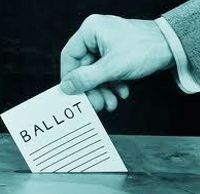- About Us
- Columns
- Letters
- Cartoons
- The Udder Limits
- Archives
- Ezy Reading Archive
- 2024 Cud Archives
- 2023 Cud Archives
- 2022 Cud Archives
- 2021 Cud Archives
- 2020 Cud Archives
- 2015-2019
- 2010-2014
- 2004-2009
 |
Across The Aisle: |
In response to Evan Kanarakis’ recent Cud article ‘A Rebranding of the GOP?’, I think it would help us to first start with a few assumptions when discussing politics:
Both sides are full of liars, who are engaged in a ‘say anything’ and ‘do anything’ struggle to get into office (note: Mr. Kanarakis’ Jeb Bush argument regarding his recent alleged change in political tact). The media is a derivative of the lying machines at this point as well. I can’t think of how many times I’ve watched a debate or an interview over the last year on a major television network, or on CSPAN, or online and witnessed just how few politicians (if any) offered up an honest straightforward answer to even the simplest ‘yes’ or ‘no’ question. When they have, my first instinct was that they’re either telling a half-truth at best, or at worst avoiding answering the question entirely. I believe this to be true of both sides of the aisle. The candidate I support is also a liar. It’s a sad thing to say.
When they have, my first instinct was that they’re either telling a half-truth at best, or at worst avoiding answering the question entirely. I believe this to be true of both sides of the aisle. The candidate I support is also a liar. It’s a sad thing to say.
Political parties are an antiquated idea. The term “mutually exclusive” is a great term when engaged in math or logic, two concepts largely absent in today’s politics. But the term itself means that two events cannot occur at the same time. So no matter what candidate I am assessing, they will have ideas that I agree with, and ideas I do not agree with… but I can only vote for the candidate, not the idea. Multiply the kneejerk voting practices that occur within the voting electorate and we’ve essentially taken any common sense out of the governing process (assuming a voter had some options to begin with).
The kneejerk voter will vote along party lines, race, gender, religion, or whatever their driver is, and ignore all of the issues and merits of each. (Insert sarcasm) Great. (End sarcasm)
 The sophisticated voter will assess all the issues, assign a weighted average importance for each issue, see where the candidates fall on each issue (with the understanding that all candidates may probably be lying about where they stand on any issue in particular), then come up with their choice of best candidate based on aggregate. In some instances we can weigh up a candidate’s prior voting record for consideration but again, the way the system works, a ‘Yes’ vote for Gun Control could actually be a ‘Yes’ vote for a bridge to be built in a specific district, and an “I don’t care either way about gun control” vote in actuality.
The sophisticated voter will assess all the issues, assign a weighted average importance for each issue, see where the candidates fall on each issue (with the understanding that all candidates may probably be lying about where they stand on any issue in particular), then come up with their choice of best candidate based on aggregate. In some instances we can weigh up a candidate’s prior voting record for consideration but again, the way the system works, a ‘Yes’ vote for Gun Control could actually be a ‘Yes’ vote for a bridge to be built in a specific district, and an “I don’t care either way about gun control” vote in actuality.
Somewhere in the middle is the voter that will isolate their decision to one or two key issues, and make a choice based on those issues alone.
So, at the end of the day, do we vote for right wing, fiscally conservative small government (even if the party as a whole stands against abortion and gay marriage and thus my progressive sensibilities) or a left wing, socialism-type welfare state (even though we know the math for such a societal model is unsustainable)? Regardless of the methodology we follow in determining a choice (kneejerk, sophisticated, somewhere in between), the fact is that both of our options are terrible. But these are the options we’re faced with, pure and simple.
And still, it amazes me that with a few days to go in the 2012 election we still had people who were ‘undecided’. Seriously? Our choices –from the Presidential race and all the way down to local races- are so polarized that if someone was still ‘undecided’ with a week left in a campaign, their vote should arguably be revoked on the grounds of pure, idiotic indecisiveness.
The last and perhaps most important assumption in all of this, however? The world is too big and complex to allow for fairness, transparency, and equality.
So now let’s get back to Mr. Kanarakis’ discussion on Jeb Bush. Let’s assume that Jeb’s father and brother was never president (since net/net I am not sure if that helps or hurts him) but let’s also revisit his quote and Mr. Kanarakis’ perception of Jeb’s possible march to the middle for the GOP:
“It is not a validation of our conservative principles if we can only point to the increasingly rare individual who overcomes adversity and succeeds in America…  Here’s a reality: if you’re fortunate enough to count yourself among the privileged, much of the rest of the nation is drowning… In our country today, if you’re born poor, if your parents didn’t go to college, if you don’t know your father, if English isn’t spoken at home, then the odds are stacked against you. You are more likely to stay poor today than at any other time since World War II. The face of the Republican Party needs to be the face of every American, and we need to be the party of inclusion and acceptance.”
Here’s a reality: if you’re fortunate enough to count yourself among the privileged, much of the rest of the nation is drowning… In our country today, if you’re born poor, if your parents didn’t go to college, if you don’t know your father, if English isn’t spoken at home, then the odds are stacked against you. You are more likely to stay poor today than at any other time since World War II. The face of the Republican Party needs to be the face of every American, and we need to be the party of inclusion and acceptance.”
Does Jeb Bush really believe that everyone should be given the same odds for success (if that is what he is saying)? Or is he just saying this because it could help get him elected (rhetorical question)? If Jeb Bush really believes everyone should have the same odds of success, well that’s great… but it’s still not possible.
Branding, rebranding should mean you are distinct, and you are identifiable. In politics, we have two brands, LEFT and RIGHT. If both move to the exact center, then neither is identifiable.
In sum, I don’t see how there can be a rebranding for the GOP because the LEFT already represents the middle. Personally, I think we are now past the point of no return. Add to the political landscape the potential combination of Obama and Hillary in the White House for 16 straight years? Please. This fight is over. Until the bills come due.
What would you like for lunch today James? I’ll have some fatalism please, thanks.
‘Big Jim Slade’ resides in Western Massachusetts.
